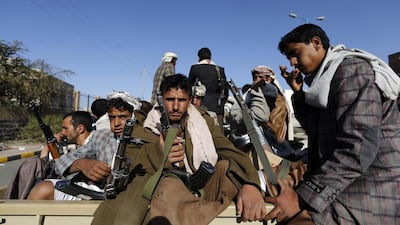Over the past few weeks Yemen has experienced clashes between tribesmen and Al Houthi militiamen, while a government led by prime minister designate Khaled Bahah has been sworn in.
The editorial in the Dubai-based daily Al Bayan referred to these incidents as “the final act of the crisis around the appointment of a new government, which brings together competencies of the Houthis and thatof the Southern Movement.
“This is a new development in Yemen, one that requires faith, goodwill and commitment on the part of all parties so that resolutions aimed at bringing stability back to the country can be implemented. This is of national interest.
“The delays in implementing the outcome of the national dialogue resulted in renewed controversy. The latest crisis, which is the result of this delay due to a failed consensus, poses grave risks to the country.”
The editorial added that “the Houthis now face a challenge to prove their goodwill. However, Yemen’s position will continue to remain clouded if attempts to control provinces as well as sectarian conflicts escalate the situation.”
This is the right time for the Yemeni authorities and the Houthis to usher in a new beginning, the editorial said. Political integration will contribute to building a new Yemen.
“The time has come for the Houthis to show national and civil behaviour, away from the religious and sectarian discourses that neither serve the interests of the country nor its people,” the editorial noted.
“They should present their political vision through a cultural perspective that respects freedom of individuals and groups, and concurs to stopping further chaos and conflict.”
In the pan-Arab daily Asharq Al Awsat, Abdel Rahman Al Rashed remarked that “there are no international forces on the ground in Yemen to support and protect the legitimate regime and transition.
“However, the one weapon that will protect legitimacy and support the new government is the international sanctions endorsed by the UN Security Council,” Al Rashed said.
“In one of the few cases in the history of disputes raised before the United Nations, all members of the Security Council have agreed to punish the isolated president, Ali Abdullah Saleh, and two Houthi leaders.
“Yemenis should not allow a small group to manipulate them and jeopardise their future. Saleh not only stole billions of dollars, but he pushed the country 30 years back”.
In the Sharjah-based daily Al Khaleej, Ahmed Mustapha Ali wrote that “in light of the events taking place frequently in Yemen on multiple fronts, observers are well aware that the country is in desperate need of tolerance and fraternity among citizens. In other words, a national reconciliation.”
Today, Yemenis no longer have the choice. Regardless of their religious affiliations, “they have to strike a comprehensive national reconciliation to lay the foundations of a brighter future, one that is conducive to development throughout the country and seeks to lay the foundations of security and stability.
“That will enable mplementation of a comprehensive national dialogue and the peace and partnership agreement,” the writer said.
“All political parties, movements and other components of Yemeni society must uphold the values of tolerance, reconciliation and acceptance of others.
“They must reject a culture of hatred, intolerance and strife, and create the conditions necessary for a brighter future for the nation.”
Translated by Carla Mirza
cmirza@thenational.ae

